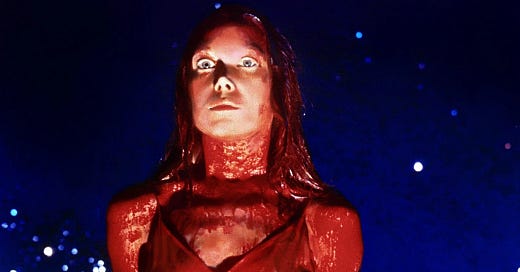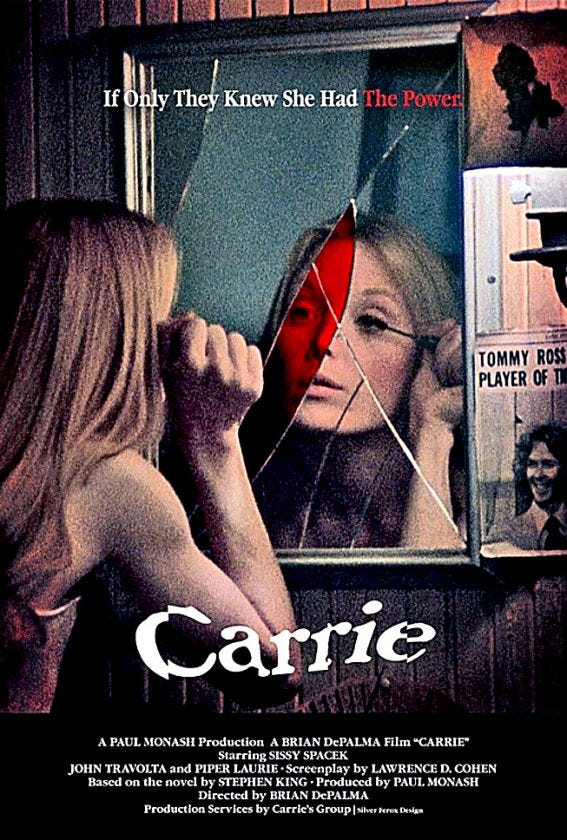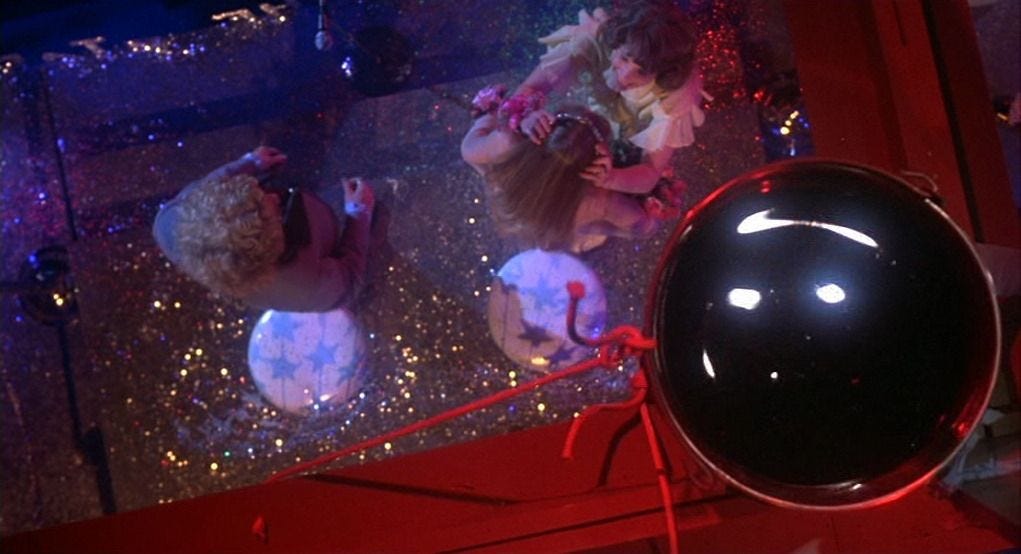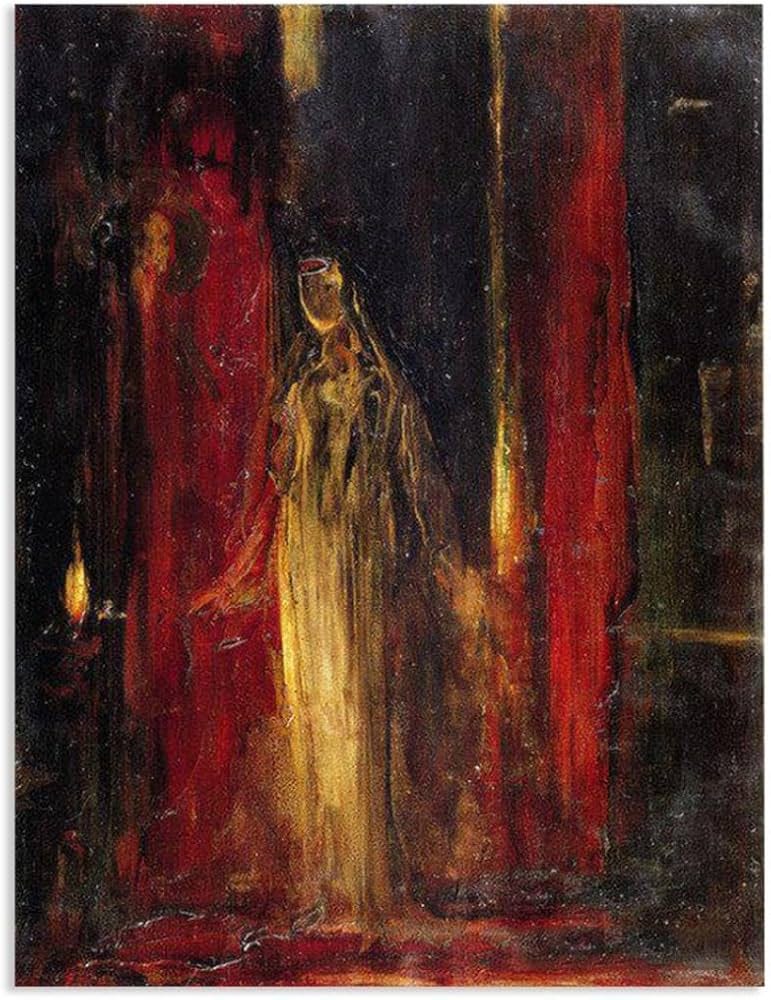Blood is the awakening the Virgin archetype, a stain of shame to bear yet at times an anointment of autonomy.
The tired old story-plot re: young cis women crossing over to corruption when they “lose their virginity” (a social construct in itself) goes hand-in-hand with the unwelcome arrival of menstruation (a centuries-long stigmatized subject). Models of “purity” from the “Virgin Goddesses” of Greek Mythology to the Virgin Mary placed “holy” context on both body and mind of young women when in reality, the patriarchy’s base value around women’s bodies over the complexity of their character and minds was often devoid of spiritual teaching. Virgin brides were a “prize”; feminine “self-containment” was revered as a trait of integrity; the bubble of innocence burst was a path to sin. Either by choice or force, the blood of “deflowering” (also a medical stereotype) was a mark the Virgin would carry into her defiled destiny, seen as less worthy henceforth.
Menstrual blood as a symbol of shame undoubtedly was perpetuated under the guise of religious “guidance”, seen as “unclean” in the Bible. The most famous movie to use menstruation as a catalyst was of course a body horror AND religious horror work leaning on ancient arcane views of developing wombs. The famous tale of the prom queen covered in pig’s blood penned by Virgo Sun Stephen King was initially thrown in the trash; he thought a grown man writing about a girl getting her 1st period would be weird (and where’s the lie?). When his wife fished it out of the bin and added input, an unsung co-collaborator, the short story would later become King’s debut novel, Carrie.
The gauzy 1976 film adaptation by Brian De Palma is a jarring yet iconic femme revenge fantasy that gained a cult following for its juxtaposition between glossy girlhood and grotesque cruelty. Sissy Spacek played the title role with an uncanny intensity, an outdated Virgin archetype in a modern world of education and experimentation that ousted her as an outcast, labeled “creepy” by her peers who had no idea of the nightmarish pressure to perform purity at home. The actress researched biblical poses to add melodramatic ante to her scenes and used sense memory technique, isolating herself and “writing poetry in the attic” to tap into the painfully shy and innocent teen persona that Spacek so perfectly portrayed.
When Carrie’s period arrives, her ignorance about menstruation flings her into a panic, the intensity of her suppression a pivotal event of bullying by multitudes of mean girls which later snowballs into a final offense that sets off the buried rage inside her. Carrie is shamed by her mother for even getting her period at all, claiming Eve’s passage “into womanhood” was a root of sin. When Carrie is asked to the prom, her mother claims her period was a gateway for more sinful temptation: “After the blood the boys come. Like sniffing dogs, grinning and slobbering, trying to find out where that smell is.” Carrie’s mother is the true villain, enforcing ideologies of body-hate onto a clueless daughter who desperately needed support.
Furthermore, Carrie is a prime example of religious generational abuse in which the child can not be themselves, strives for perfectionism, is burdened by an overactive conscience, lacks normal exposure to the outside world and has no sense of free will. The fact that Carrie inherited her deceased father’s telekinetic abilities only makes her more of a target for demonic blame. Her “powers” align as the abject of rage. Unlike menstruation which wombies are told shamefully to keep private, Carrie’s secretive ability to move objects is her salvation and yet another reason for her Otherness. The smallest hint that Carrie might pursue pleasure or use her “Satanic” abilities was punished; she would be locked in a creepy “prayer closet”, a parallel any queer kid who suffered Christian ideology in youth may be sadly familiar with.
“At sixteen, the elusive stamp of hurt was already marked in her eyes.”
Not only was Carrie groomed to be an ideal “good” based on unhealthy purity culture, her mother instilled a constant fear for her safety when Carrie disobeyed. The natural desire to explore in the “maiden phase” was viewed as devil-temptation. Carrie was an example of a people-pleaser both in trauma-response to her unhinged fanatic mother and in pursuit of acceptance at school. Carrie’s dream of “normalcy” percolated despite her mother’s warnings (“they’re all going to laugh at you”) and she saw no other way to turn the tables than to use her telekinetic powers to push-back just so she could go to her senior prom. This brief enjoyment on her first date and her first kiss was so tenderly depicted in De Palma’s film. The glimmer of FREEDOM that Carrie had with Tommy was a momentary Heaven, the ONLY happiness we see the character experience the entire movie, a sliver of hope in a sheltered suppressed life, soon to become a burning Hell.
All of this is abruptly interrupted by a sadistic prank, a heartbreaking scene of public humiliation, a tormented teen girl’s dreams shattered… and Carrie finally snaps. The chaotic crescendo is indeed part of a classic cautionary tale, the victim who becomes the monster yet meek and mouse-like in presentation. There’s nothing so painfully pent-up than a dutiful Acts of Service daughter who becomes the ultimate Scapegoat at home and at school. There are consequences for ostracism and the trickle-down effect of abuse: hurt people hurt people (including those who do not deserve it) when they do not have the proper tools and support system(s) to heal. In the end, Carrie’s powers are used in self-defense against her only family member and she ends her life on the physical plane after succumbing to her rage.
“If only [the Day of Judgement] would be today and Jesus coming not with a lamb and a shepherd’s crook, but with a boulder in each hand to crush the laughers and the snickers, to root out the evil and destroy it screaming—a terrible Jesus of blood and righteousness. And if only she could be His sword and His arm.”
Negative interpersonal experiences in youth seep into our blood, infiltrating emotional reactivity long after we are children. Everyone knows what it is like to be harshly rejected AT LEAST ONCE as a kid, a formative experience that tears at self-worth, leaving lashes of insecurity for years to come. Invalidation executed by a caretaker or, worse, emotional and/or physical abuse inflicted by someone who is supposed to be “safe” creates both fear and confusion for a small child. Threats of harm with anticipation of love cross signals. Children thrive with consistency from focal family figures. When reliant on an erratic abusive parent for survival, hyper-vigilance takes over, each interaction a cower re: what version of treatment we were going to receive. And children learn quickly how to placate poor treatment from parents even if they do not understand that they do not deserve to be treated with such cruelty.
“Less” traumatic levels of childhood invalidation can cut just as deep. Casual dissuasion from authentic expression of emotions or individuality can create a constant bargaining of external expectations against one’s inner light. All these experiences are hard on the child-brain, not able to decipher between concern and control. In early years, we are sponges re: what we are told about ourselves, forming beliefs without the logic we’ve yet to develop. When growing up with parents that never unpacked their own bad displays of behaviors (whether towards their spouse or their children), we do not UNDERSTAND anger itself and absolutely do not learn how to express it in healthy ways. An abusive adolescent environment that is justified and excused by the harmful parent who even goes so far to blame the child for the abuse they receive causes even more confusion and a complicated attachment wound that craves love but doesn’t feel worthy of receiving it.
Small spies of sweetness or little flickers of intuition inform us eventually, but it takes years to reprogram being a witness of and a victim to the limiting self-beliefs that abuse and invalidation create.
I will never advocate for life without a range of emotional expression as I do think suppression of anger ~especially as an expectation of WOC and queer femmes~ leads to internalized resentment and a whole slew of harsh coping mechanisms and/or self-destructive behavior. We absolutely have a right to reclaim anger in a way that uplifts us, though this is often nay-sayed by men in power. The patriarchy’s standards for decorum and decency are absolutely worthy of deconstructing yet we compulsively feel guilty for outbursts about our experiences or awkward about admissions of abuse. I not only is there room for anger (though delivery matters), anger is NECESSARY. Anger as alchemy can be revolutionary. Once we stop denying our own internal rage and instead work WITH it ~instead of it working through us~ we start to heal and we help ourselves know it’s NORMAL to feel angry about the injustices they have experienced.
Suppressing anger becomes its own disease and the projections that will eventually spew from it are a poison.
WHAT: Blood Full Moon in Virgo/Total Lunar Eclipse
WHEN: Friday March 14th, 2025 2:54 AM EST
THEME: Daughter of the Devil, Blood of the Lamb
The archetype of the Virgin is too often placated into a role of bending over backwards to no end, a “suffering servant” humbled away from self-validation, in a constant compulsion to give and never take. A Virgin’s value is based on her labor, her body, but archetype explorers DO tend to note a reclamation outside of the physical via her mental determination. Virgo as the Virgin does indeed have strong association with the physical self as wellness and health are in her domain of the 6th House, but Service is the cornerstone of meticulous Mutable Earth. Virgo studies and soothes, observatory and obedient, motivated to protect the small and fragile and weak. Virgo is reserved but responsible, forever and always.
We’ve not have a Virgo Lunar Eclipse since 2008 and Virgo is a tricky in the South Node story. The South Node in Virgo asks us to let go of perfectionism and hyper-criticism (not just of others but of ourselves) and Virgo often finds she does not know who she is without her hard-lined patterns. Virgo does not want to be unraveled. Virgo wants to be a neat little shiny ball of efficiency, never a mess of emo-vom or explosion. Friday’s Virgo Full Moon rages against Pisces Season; the Fish in the North Node can not seem to calm the Virgin’s drive to burn herself out for gold stars on her report card. But the North Node now has a stronger tow, trapping Virgo in a net of the Unknown by its own fateful navigation, and she finds she’s somewhat seduced by it. Pisces accepts ALL; its pond is a peaceful place to swim.
Keep reading with a 7-day free trial
Subscribe to THE FEMME MOON to keep reading this post and get 7 days of free access to the full post archives.








